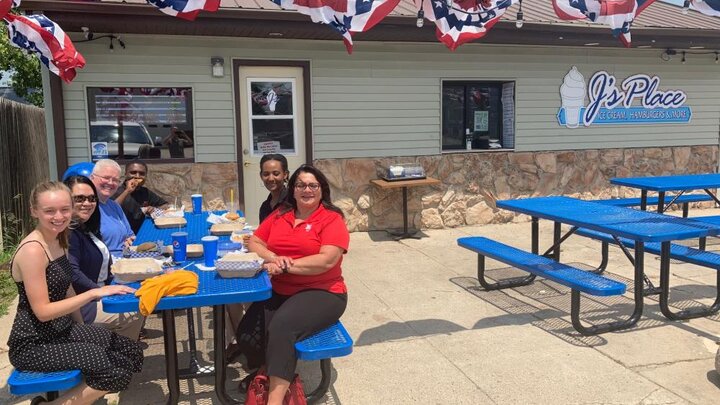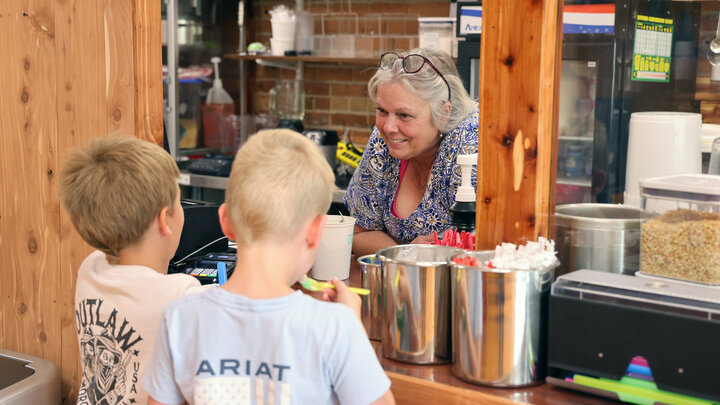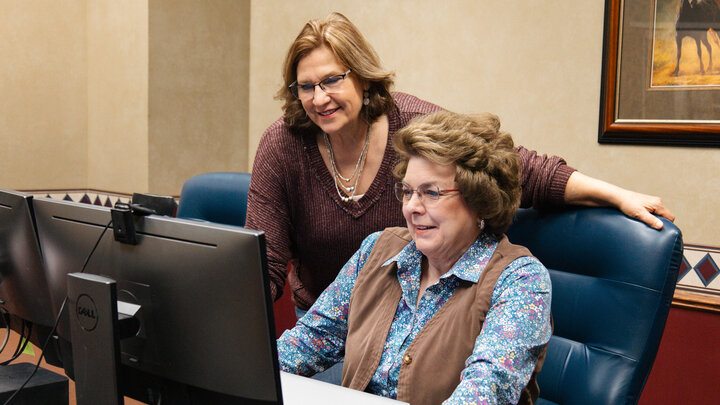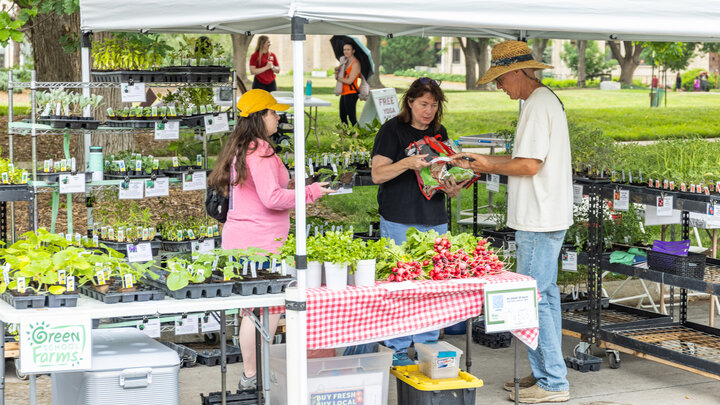Twenty-six students begin their 10-week internships in 16 Nebraska communities on May 24. They are the newest cohort of Rural Fellows, an experiential learning program organized through the Institute of Agriculture and Natural Resources’ Rural Prosperity Nebraska initiative.
These students will work with mentors and leaders in their assigned communities to plan and execute community-improvement projects. Designed by the communities themselves to meet the needs of local residents, some of these projects include increased civic engagement, tourism development, social media marketing, and improved mental and physical health capacities.
“The Rural Fellowship isn’t a Band-Aid program where we come into a community, ‘fix’ things for 10 weeks and then leave,” said Helen Fagan, program coordinator. “This is a community-driven initiative where fellowship students are engaging with and learning from communities, helping locals amplify their culture and build the capacity within themselves to continue to progress and thrive long after the students leave.”
Having gone through multiple iterations in its nine years, the Rural Fellowship program was originally coined a “serviceship,” a melding of community service and traditional internship. As the focus has always been on vitality in rural communities, students from across the globe have started participating. This year, 22 students are from the University of Nebraska–Lincoln, five of which are members of Cultivate Access and four are members of the Rwandan Institute of Conservation Agriculture in Rwanda; four attend the University of Nebraska Medical Center; and one is from Texas Tech University.
“It’s hard to summarize the positive impacts and benefits this summer’s fellows project has had on our community,” said Wahoo Utilities General Manager Ryan Hurst, who hosted students in 2021. “The level of design that we are getting on our future water improvements downtown is much greater than we normally have on a project this size.”
“(The student fellows) helped us share the importance of early childhood education to the future of our community and local economy,” said Katie Walmsley of the Ord Area Chamber of Commerce, who also hosted students in 2021. “It’s not just new buildings and property tax valuations. It’s also about creating opportunities for all who live here and those who wish to live here.”
Community improvement is just part of the story, Fagan said.
“Student fellows also gain real-world, real-time experience with economic development, event planning, problem solving and inclusive leadership — many of the skills that will help them succeed in their careers and be an instrument for good in the communities they end up living in.”
While communities design their projects, students are often given the freedom to apply their education in executing the projects. In 2021, Arapahoe’s community leaders wanted to increase business in the downtown area, so student fellows Haley Burford and Kennedy Kriewald organized a Small-Business Saturday event, where locals could shop special sales and participate in activities focused on strengthening the local economy. In Imperial, the community wanted to improve recreation, so fellows Isaac Archuleta and Joel Kreifels helped organize a farmers market and music festival.
“The hands-on and shadowing experience I had from this opportunity was far more enriching than merely hearing about it in a class,” said Allison Metschke, a 2021 fellow who served in Wahoo.
Student fellows are paired with communities based on their education and experience. They are prepared to meet whatever challenges lie ahead.
“I believe that having limited exposure to the world hinders what can be done and learned,” said Elizabeth Pernicek, who will serve in Alliance. “I’m looking forward to meeting new people and gaining more points of views than I had before, as well as gaining real-world experience that wasn’t previously available to me.”
“In the future, I would like to be an advocate of rural and underserved communities,” said Marlette Grace Dulcinee Mabiala-Maye, who will serve in Valentine. “So this experience will be an asset for me as a future community leader.”
This year’s fellows represent 13 communities, 11 majors, four countries and two states. They are listed below by the communities in which they will serve, with their major(s) and hometown.
- Alliance: Landyn Bish, architecture, Lincoln; Elizabeth Pernicek, architecture, Brainard; Eric Pulver, Master of Public Health, Omaha.
- Dawes, Sheridan and Sioux counties: Faith Junck, agricultural and environmental sciences communications, Carroll; Benoit Kayigamba, integrated science, Lincoln.
- Gering and Scottsbluff: Lauren Campbell, pre-medical biology, Kearney; Esther Ingabiribyishaka, integrated science, Kigali, Rwanda.
- Kimball County: Clare Umutoni, integrated science, Kigali, Rwanda.
- Nebraska Co-op Development: Pascaline Niyonshuti, integrated science, Kigali, Rwanda.
- Nebraska Energy: Yvonne Ingabire, integrated science, Kigali, Rwanda; Anne Kluthe, environmental studies, Flower Mound, Texas.
- Nebraska Leadership Development: Marthe Niyingenera, integrated science, Kigali, Rwanda.
- Nebraska — IANR Communications: Laurent Ikuzwe, integrated science, Kigali, Rwanda.
- Nebraska Rural Childcare: Flora Sangwa Gwaneza, integrated science, Kigali, Rwanda.
- Nebraska Rural Community Resilience: Japhet Ingeri, integrated science and natural resources, Lincoln.
- Nebraska Rural Housing: Aline Abayo, integrated science, Kigali, Rwanda.
- Scotts Bluff County — Area Visitors Bureau: Murengezi Atali Benimana, integrated science, Kigali, Rwanda; Ashtyn Humphreys, agricultural economics, Odell.
- Scotts Bluff County — Empowering Families: Arden Kimme, Master of Public Health, Lincoln; Alexandra Salinas, agricultural leadership, Mission, Texas.
- Stanton: Josie Ganser, pre-veterinary medicine/animal science, Ainsworth; Gabin Kundwa, integrated science, Kigali, Rwanda.
- Valentine: Marlette Grace Dulcinee Mabiala-Maye, Master of Public Health, Brazzaville, Democratic Republic of the Congo; Carine Mushimiyimana, integrated science, Lincoln.
- Wakefield: Devi Venkata Naga Akshay Varma Dwarabandam, epidemiology, Hyderabad, India; Jacob Zitek, mechanical engineering, Plattsmouth.




